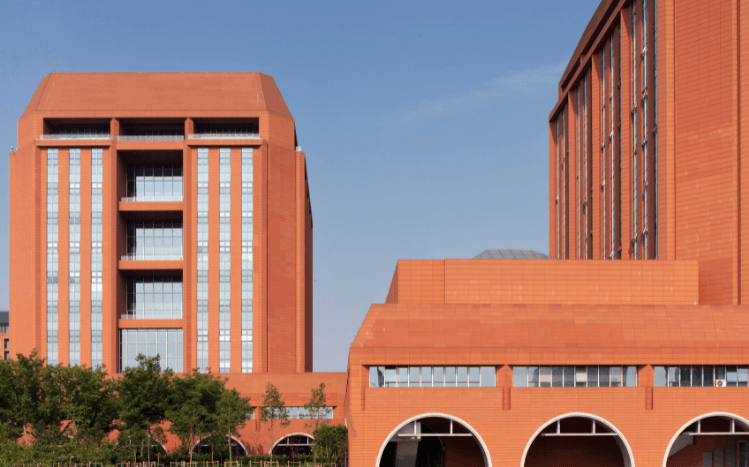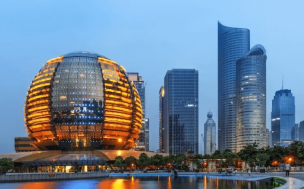Due to its thriving startup environment, the city is referred to as ‘China’s Silicon Valley’.
In Hangzhou, you’ll find the ‘Future Sci-Tech City’—the innovation and venture incubator created by the Zhejiang government in partnership with Chinese ecommerce giant Alibaba.
There’s also the fintech capital of XiXi Valley Internet Finance Town, which is home to 250 companies, and the Hangzhou Blockchain Industrial Park, which is backed by $1.6bn of funding for blockchain startups.
The Zhejiang University Global MBA curriculum centers around innovation, and global competence, aiming to develop competitive leaders with an entrepreneurial and global vision.
Zhejiang University MBA Curriculum
When enrolling on the Zhejiang University Global MBA, students will still experience all the core elements of a traditional MBA, but with an added unique angle on digital innovation and globalization.
The MBA in China aims to educate students on the complexities and industry practices of Chinese markets and the worldwide business landscape.
“The program is designed to cultivate future leaders with global perspective, innovative capability, entrepreneurial spirit, and social responsibility," says Lili Wang, Zhejiang University Global MBA program director.
The Global MBA curriculum aims to redefine digitalization, innovation, and global competence, she addds.
In the digitalization aspect of the program, students will be equipped with knowledge and skills hoping to prepare them for their future careers in the technologically advanced business world. For the first time, courses include ‘Frontiers in Business Analytics and AI,’ ‘Brand Management in the Digital Age,’ and ‘Business Intelligence.’
Students expand their knowledge of future business trends further through topics focused on innovation, exploring carbon-free, technology innovation, and innovative entrepreneurship. The new program design has introduced courses such as ‘Corporate Innovation and Strategy for Carbon Neutrality,’ ‘Technology Leadership,’ and ‘Intellectual Property.’
Students will also gain global competence and perspective in courses such as ‘International Business’ and ‘Cross Cultural Management.’
“The international industry experience of the professors made for really interesting discussions during class. It was great to hear their opinions and to hear business theories linked to real-world situations from their career,” says Lynne Wen, current student on the Global MBA program.
The ‘International Business’ course also invites professors and CEOs from Fortune 500 companies and different cultural backgrounds to introduce business practices in their countries.
“The program design incorporates management theories, pioneering technology, and cultural awareness into the curriculum in light of globalization and artificial intelligence,” says Lili.
Careers after an MBA in China
For budding entrepreneurs or those who want to make waves in the tech industry, Hangzhou offers a wealth of opportunities for grads.
In support of the city’s entrepreneurial environment, the Zhejiang government have introduced a number of initiatives to aid startups and accelerate digital transformation including aid packages, tax cuts, and favorable regulation policies.
MBA grads in China also have access to some of the world’s largest companies.
As part of the Global MBA program, ZJU-SOM partner with multinational companies such as Alibaba, GM Digital, and Hikvision to offer students three-to-six-month internships.
Taking advantage of these opportunities, 60% of Global MBA grads stay in Hangzhou after graduation, while 20% start their own companies.
Lynne aspires to land a managerial role at a manufacturing company that implements innovation and technological advancements across domestic and international markets.
“The course was so helpful in helping us decide which career path is the best fit and tailoring our strengths and weaknesses towards our goals,” she says.
The Career Development Office at Zhejiang University provide interview and resume workshops and on-campus recruiting fairs with partners such as Bain & Company, Huawei, and Tencent.
If you want to take advantage of Hangzhou’s rapidly growing entrepreneurial hubs or launch a global career in China, studying an MBA at Zhejiang might be the right move for you.
MBA application process at Zhejiang University
For domestic and international candidates, there are differing requirements when joining the Zhejiang Global MBA.
Chinese candidates must have at least two years work experience with a master’s degree or three years with a bachelor’s degree. However, for international applicants, Zhejiang accepts candidates with less work experience who can demonstrate they are a good candidate for the program.
International candidates have the chance to show this in a 1500-word personal statement and two recommendation letters as part of their application.
Chinese students are not required to take the GMAT exam as they must complete a national entrance exam.
International applicants are encouraged to take the GMAT to support their application. Zhejiang University also offer a GMAT scholarship in which candidates with a score above 750 can receive 50% of their tuition fee. Those with a score ranging 680-750 can receive 25% of their tuition fee.
The application deadline for the next intake for the Global MBA cohort is February 28, 2023.








